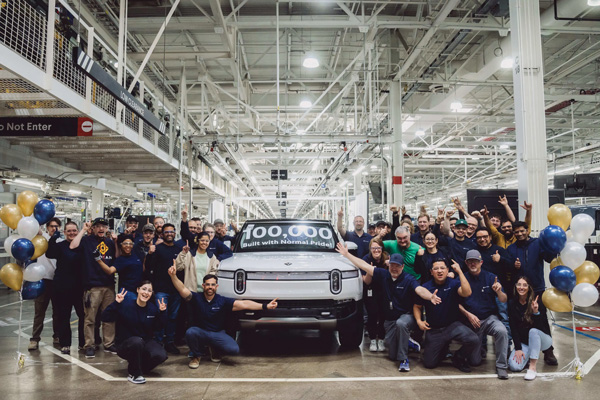Expanding incentives support a growing ecosystem.
When the 100,000th Rivian rolled off the line at the automaker’s plant in Illinois last spring, the smiles of assembled Rivian autoworkers reflected the spirit of a banner draped across the SUV’s windshield: “Built With Normal Pride,” it read.
The moment served as another mark of validation for an electric vehicle maker that landed in 2017 in Normal, Illinois, amid certain reserves of doubt. The untested California startup with little more than a prototype was proposing to convert a shuttered Mitsubishi plant — whose closure had claimed more than 1,200 jobs — and build electric SUVs and pickups there. At a time when EVs still were considered exotic, the notion struck some as far-fetched. An electric pickup truck?
“To be honest, we didn’t know what Rivian would be,” recalls Chris Koos, Normal’s mayor since 2003, “so there was some initial skepticism. You know, ‘Who are these guys? What are they going to do in our community? Will it be a flash-in-the-pan kind of startup and then go away?’ ”
But in the ensuing seven years, even as several ambitious EV startups have indeed come and gone, Rivian has not just survived but has expanded and by many measures thrived. From what officials in Normal initially assessed as a “niche” company, Rivian is now the second-largest employer in McLean County, with a payroll around 8,000. Take a spin in Rivian’s R1 and try not to be wowed by the SUV’s acceleration — officially zero to 60mph in 3.5 seconds, but seemingly even faster — the gentle ride and attractive interior all assembled exclusively in Normal. The R1 consistently fares well in head-to-head matchups with competitors such as the Model X of industry leader Tesla.
“The 2024 Rivian R1S is not only a more affordable vehicle, but it’s also more spacious, has a longer range and comes with a higher-quality cabin,” reads a recent comparison from U.S. News & World Report. “If you want the whole package,” the multi-point assessment concludes, “go for the Rivian.”
Having already invested some $2 billion in its Normal facility, Rivian notched another major milestone in May, when it announced plans to expand plant operations through an $827 million incentive package provided by the Illinois Department of Commerce and Economic Opportunity. The expansion is to pave the way for production of the company’s R2 SUV, to be introduced in 2026 at a lower starting price of $45,000.
“The support from the state will allow us to quickly bring our midsize R2 to market and provide even greater consumer choice for EVs,” said Rivian founder and CEO RJ Scaringe. “We look forward,” he added, “to continuing our close partnership and building upon the success we have enjoyed.”
“Rivian shows that we were willing to take a risk on new technologies. They’ve proven themselves to be great community partners. We’re very, very proud to have them here.”
— Chris Koos, Mayor of Normal, IL
That success, said Mayor Koos, has become a source of pride for Normal, which brands itself an “EV Town.” Rivian, he said, “shows that we were willing to take a risk on new technologies. They’ve proven themselves to be great community partners. We’re very, very proud to have them here.”
Billions for Batteries
Passed with bipartisan support by the Illinois legislature in 2021, the Reimagining Electric Vehicles in Illinois Act (REV) is a highly competitive incentives program created to attract companies along the EV supply chain. The law also serves to support the State’s ambitious climate agenda, whose goals include putting a million EVs on the road by 2030. In 2023, Illinois doubled down, introducing a major expansion of its clean energy incentives through Invest in Illinois, a $400 million closing fund available to major job creators.
Both programs played roles in what Gov. JB Pritzker has called “the most significant new manufacturing investment in Illinois in decades,” a $2 billion EV battery “gigafactory” planned for Kankakee County, south of Chicago. Gotion has committed to creating 2,600 jobs at the site of a former K-Mart warehouse in the town of Manteno.
Gotion is the first recipient of Invest in Illinois funding, crafted to help major employers with up-front capital costs. The $125 million “Invest” award is part of an incentives package valued at $536 million. The State will also fund a new manufacturing training academy and will award an additional grant to workforce providers to expand training and prepare regional employees for the new jobs.
Mark Denzler, president and CEO of the Illinois Manufacturers’ Association, hailed Gotion’s investment as “a huge win” for Illinois.
“We are proud to have partnered with Gov. JB Pritzker’s administration and lawmakers on both sides of the aisle to put in place incentives to help bring these businesses to Illinois,” he said, “and we look forward to the continued success of this important industry.”
Another factor in Gotion’s decision to choose Illinois after a nationwide search was the input of ComEd. One of the country’s five biggest utilities, ComEd delivers power to some 70% of Illinois’ population, including Chicago and surrounding areas. In addition to rendering support in identifying potential sites, ComEd is adding a large mobile transformer to help kickstart Gotion’s production in 2024 and will build a substation to support the project’s massive need for electricity.
“ComEd’s expertise and capacity,” said Mohamed Ali Zeitoun, Gotion’s deputy director of manufacturing, “make it an essential partner as we expand our operations.”
Gotion will become the largest employer in Manteno, a town of fewer than 10,000 people about an hour south of Chicago on Interstate 57.
“The addition of an EV battery manufacturing site represents a great future of economic opportunity for our village,” said Manteno Mayor Tim Nugent. “Gotion’s upcoming production plant not only symbolizes progress but also stirs anticipation for the abundance of educational and employment opportunities it offers.”

